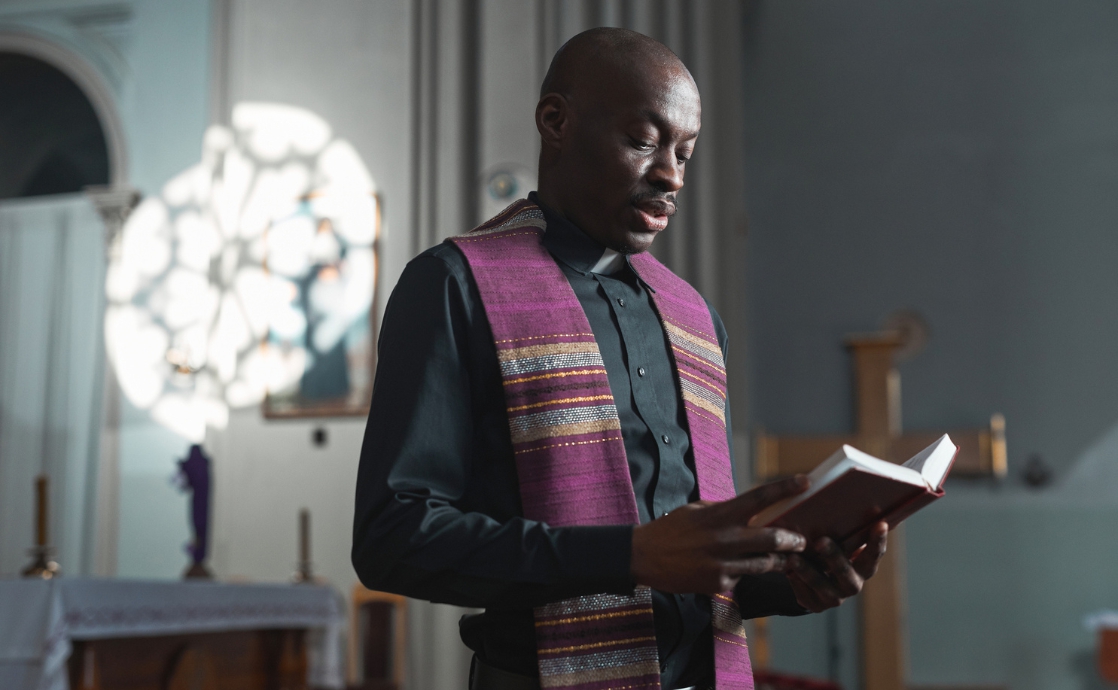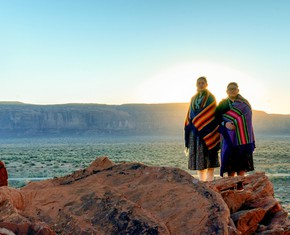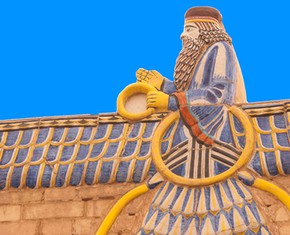The views expressed in our content reflect individual perspectives and do not represent the authoritative views of the Baha'i Faith.
The Harlem preacher Reverend James T. Simpson had a remarkable spiritual odyssey – from Presbyterian minister to Methodist pastor, to Baptist preacher, and finally to becoming a Baha’i.
After he first encountered the Baha’i teachings, an enthusiastic Rev. Simpson wrote to Abdu’l-Baha to express his intention to travel to North Africa to spread the Baha’i message of racial unity. Abdu’l-Baha warmly gave his blessings, and assured Rev. Simpson of divine assistance in this noble endeavor:
If it is possible and easy, undertake a journey to North Africa and enkindle there the fire of the love of God and summon the souls to the Revelation of Baha’u’llah and to the unity of mankind, so that religious, racial, sectarian and worldly prejudice may not remain and all may be brought to a full realization of the Truth. If thou goest, assuredly the confirmations of God shall assist thee.
On Wednesday, June 8, 1921, Rev. Simpson addressed the congregation of the Unity Church in Montclair, New Jersey, where Anna Van Blarcom also spoke at a gathering of another “Rainbow Circle,” meeting, which regularly met on Wednesday evenings there.
RELATED: From Black Baptist Preacher to Baha’i Teacher
Rev. Simpson had already announced his plan to travel to Morocco. On this particular occasion, however, Rev. Simpson preached — not as an ordained Methodist pastor, Presbyterian minister, or Baptist preacher — but as a representative of the Baha’i Faith, which has no clergy.
In that way, he demonstrated the depth of his convictions by leaving behind him his former prestige (and income) as a church minister. The Montclair Times news story reported, in part:
The Rainbow Circle held its regular weekly Wednesday evening at Unity Church. Rev. James T. Simpson, of New York, who will shortly go to Morocco, North Africa, to spread the Baha’i message, addressed the members of the circle and their friends. His subject was the first basic [Baha’i] principle … “The Oneness of the World of Humanity.”
We don’t know, at this point, whether Rev. Simpson’s travel to Morocco indeed took place. But many other newspaper accounts of Rev. Simpson giving services at various functions at Harlem’s First Emmanuel Church exist in the annals of the period’s African American newspapers. (See, for instance, “News of the Churches: First Emmanuel Church,” The New York Age, Saturday, May 22, 1920, Page 8; and “News of the Churches: First Emmanuel Church,” The New York Age, Saturday, November 20, 1920, Page 2)
On Thursday, March 17, 1921, Rev. Simpson read his congregation the text of Chapter 25, “The Holy Spirit,” from Abdu’l-Baha’s book Some Answered Questions:
Question.—What is the Holy Spirit?
Answer.—The Holy Spirit is the Bounty of God and the luminous rays which emanate from the Manifestations; for the focus of the rays of the Sun of Reality was Christ, and from this glorious focus, which is the Reality of Christ, the Bounty of God reflected upon the other mirrors which were the reality of the Apostles. The descent of the Holy Spirit upon the Apostles signifies that the glorious divine bounties reflected and appeared in their reality. Moreover, entrance and exit, descent and ascent, are characteristics of bodies and not of spirits—that is to say, sensible realities enter and come forth, but intellectual subtleties and mental realities, such as intelligence, love, knowledge, imagination and thought, do not enter, nor come forth, nor descend, but rather they have direct connection.
For example, knowledge, which is a state attained to by the intelligence, is an intellectual condition; and entering and coming out of the mind are imaginary conditions; but the mind is connected with the acquisition of knowledge, like images reflected in a mirror.
Therefore, as it is evident and clear that the intellectual realities do not enter and descend, and it is absolutely impossible that the Holy Spirit should ascend and descend, enter, come out or penetrate, it can only be that the Holy Spirit appears in splendor, as the sun appears in the mirror.
In some passages in the Holy Books the Spirit is spoken of, signifying a certain person, as it is currently said in speech and conversation that such a person is an embodied spirit, or he is a personification of mercy and generosity. In this case, it is the light we look at, and not the glass.
In the Gospel of John, in speaking of the Promised One Who was to come after Christ, it is said in chapter 16, verses 12, 13: “I have yet many things to say unto you, but ye cannot bear them now. Howbeit when He, the Spirit of truth, is come, He will guide you into all truth: for He shall not speak of Himself; but whatsoever He shall hear, that shall He speak.”
Now consider carefully that from these words, “for He shall not speak of Himself; but whatsoever He shall hear, that shall He speak,” it is clear that the Spirit of truth is embodied in a Man Who has individuality, Who has ears to hear and a tongue to speak. In the same way the name “Spirit of God” is used in relation to Christ, as you speak of a light, meaning both the light and the lamp.
This open, forthright teaching of the Baha’i Faith to his African American audience continued on Thursday, August 18, 1921, when Rev. Simpson read from Baha’u’llah’s Hidden Words at the Rainbow Circle meeting:
The Rainbow Circle held a splendid meeting on Thursday night, which was well attended. Rev. Simpson read from the [“Hidden Words”] the prayer followed with a reading by Miss D. Smalls. Reading by Mr. Fieldman from [Abdu’l-Baha’s] book, “What is the wisdom of the spirits’ appearing in the body.” The address by Pastor Bolden which was very interesting, was followed by Mrs. Ford, who gave an interesting account of her stay in Green Acre, Maine. … Closing remarks and prayer by Pastor Bolden. Refreshments were served at the close of the program.
RELATED: A Persian Goes to Harlem – to Unite the Races
Recall that “Pastor Bolden” has also declared himself (and the First Emmanuel Church as well), as Baha’i, as previously noted in Part 70. “Green Acre” is the name of a long-time Baha’i school in Eliot, Maine. The fact that Rev. Simpson read from Baha’u’llah’s book of mystical aphorisms, The Hidden Words, attests to Rev. Simpson’s new-found and full-fledged identity as a Baha’i.
We know as well, from various newspaper reports, that the Reverend’s wife Mrs. “Caroline” Simpson also gave readings at the church from unnamed Baha’i sources. Research continues, but at present, little is known of Rev. Simpson (or his wife) after late 1922, as a positive identification of him does not appear in any further press reports of First Emmanuel Church meetings, or indeed in any form – but stay tuned!
What we do know is this remarkable fact: the teachings of Baha’u’llah – that the world’s races, nations, and religions must unite – were preached from the pulpit of America’s Black churches more than a century ago.

















Comments
Sign in or create an account
Continue with Googleor